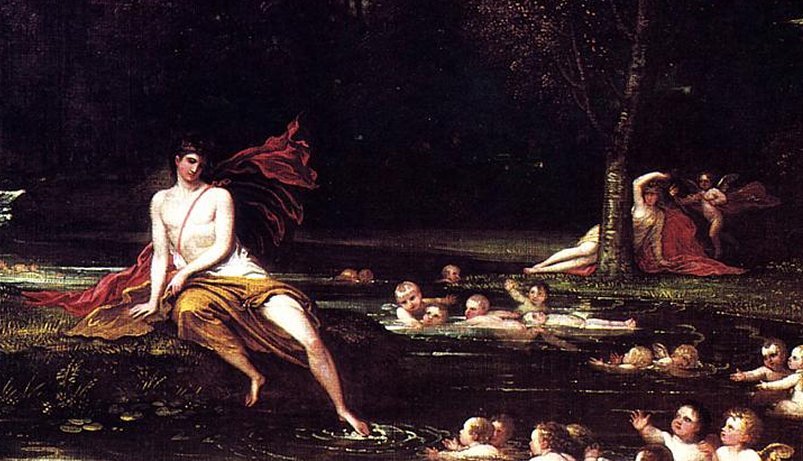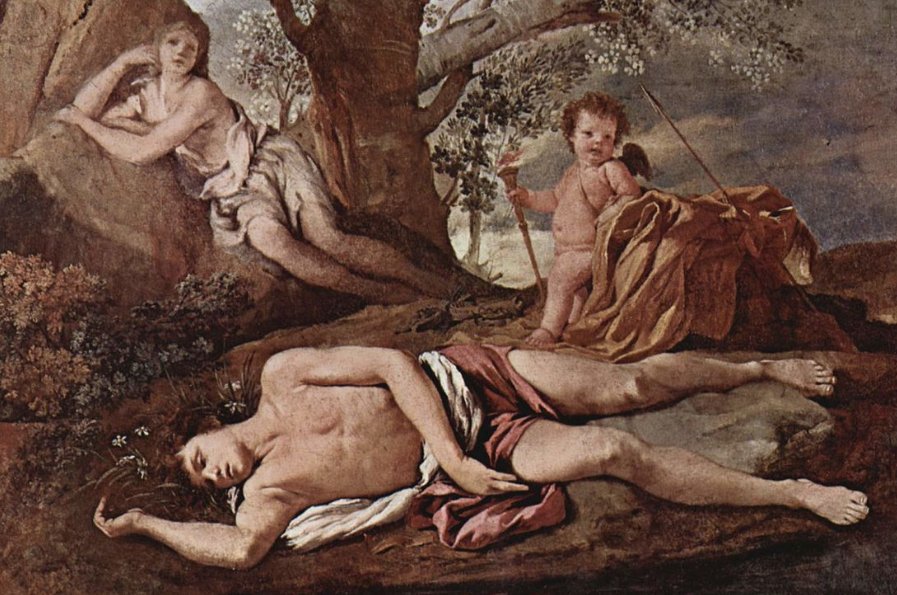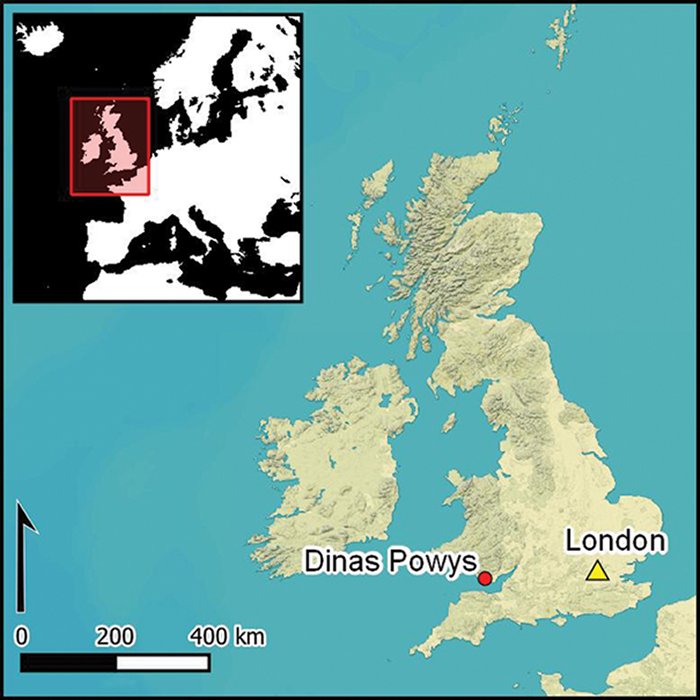A. Sutherland – AncientPages.com – It is a literary work that has inspired numerous works of art through the centuries and is considered one of the most touching stories ever written.
Due to this beautiful story, we learn the meaning behind the word ‘Echo’ that originates in the Greek myth about a mountain nymph whose ability to speak was cursed, leaving her able only to repeat the last words spoken to her.
 Narcissus and Echo by West, Benjamin, 1805. Source
Narcissus and Echo by West, Benjamin, 1805. Source
To this day, Echo’s voice is heard from labyrinths, caves, the walls of forests, mountain slopes, rocks, and ravines, according to an ancient belief.
This myth tells a story of punishment for rejecting love and boundless selfishness and self-admiration that hurts. It speaks even about a misdirected and unfulfilled love.
According to Ovid, one of the great ancient Roman poets, Zeus gave the mountain nymph Echo the task of entertaining and distracting his wife, Hera, and keeping her from discovering his erotic escapades.
Friendly and fun-loving individual, Echo was a favorite friend of Artemis.
Punishment Of Echo
She was also popular among nymphs, her sisters, and friends – but disliked by Hera, who, known for her jealous and vengeful nature, became suspicious and angry with Echo, mistaking Echo as the object of Zeus’s vulgar affections. Aware of her husband’s love affairs, especially with beautiful nymphs, she put a curse on an innocent Echo, even though she had played no part at all in Zeus’s intimate relationships.
“Young lady, your chattering has done you in, and you will be punished for it! From this moment forward, the only words you will ever be able to utter will be exactly those words that other people have said to you first,” said furious Hera.
She punished Echo for interfering with her plans. Burdened with an awful punishment, Echo lost her privilege to speak on her own again and could only be able to repeat others’ last words.
Cold And Proud Narcissus In Love With His Image
Cold, proud, and beautiful human youth, Narcissus loved no one and always considered himself worthy of love. He got lost once in a dense forest while hunting, and the nymph Echo accidentally saw him. She fell in love with him, but she followed the boy and waited for him to speak first because of the curse. Narcissus looked around after for his companions, not knowing where to go, and shouted:
“Hey, who’s here?”
“Here!” Echo’s reply was loud.
“Come here, come to me!” Narcissus shouted.
And the Echo responded happily.
“To me!”
A nymph stretched out her hands and hurried to Narcissus. He saw her, but as proud and selfish as ever, the beautiful Narcissus instantly pushed her away and disappeared into the dark forest. He rejected everyone’s love. Many of the nymphs were made unhappy by his pride. This time, he decided he’d rather die before letting a wood nymph have him and pushed her away.
 Echo and Narcissus by Nicolas Poussin, Louvre Museum – Public Domain
Echo and Narcissus by Nicolas Poussin, Louvre Museum – Public Domain
Echo hid in a cave in the impenetrable forest suffering from the love of Narcissus. She grew skinny from starvation without eating and sleeping until her body withered entirely into dust, leaving nothing but her voice.
Nemesis Punishes Narcissus Who Falls In love With His Reflection
Later, the goddess of revenge, Nemesis, decided to punish Narcissus for his behavior. She led him to a pool, where he saw his reflection and fell in love with it. He refused to leave his reflection and, like Echo, starved to death, but before it happened, he cried out: “Farewell, dear boy…beloved in vain.”
Echo’s voice repeated the lament from the cave, but Narcissus was already ᴅᴇᴀᴅ.
A fixation on himself eventually killed him, and he had to pay a high price for his misdirected love.
Danger Of Excessive Self-Love
In the myth, the water acts as a mirror, reflecting Narcissus’ state of mind and what is happening around him. It calms down, then becomes cloudy, and eventually disappears.
This beautiful Greek myth shows various aspects of nature. The nymph Echo becomes the repeтιтion of sound, and Narcissus –which symbolizes self-sufficiency, narcissism, and vanity from now on becomes a flower. Echo and Narcissus both died of unfulfilled love. They became so obsessed with their love that they stopped caring for themselves and had to die.
There is also a moral to this story. Narcissus’s death and transformation demonstrate the danger of excessive self-love, which can also be self-obsessive and called narcissism.
The myth precisely demonstrates this kind of behavior, and individuals with narcissistic personality disorder have an impressive sense of self-importance. They seek unlimited admiration from others and fantasize about continued successes or power.
Like the beautiful Narcissus, they believe they are special and unique, even superior to others. But are they?
Written by – A. Sutherland – AncientPages.com Senior Staff Writer
Updated on July 6, 2022
Copyright © AncientPages.com All rights reserved. This material may not be published, broadcast, rewritten or redistributed in whole or part without the express written permission of AncientPages.com
Expand for references
References:
Walsh, N. Greek Mythology
Pickering D. Ancient Greece





